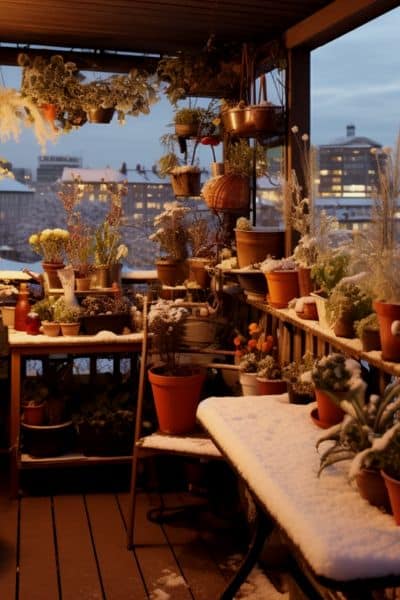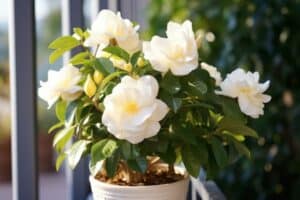As a landscape gardener, I know that winter can be a challenging time for balcony gardeners.
As winter approaches, you may be wondering how to protect your balcony plants from the harsh weather conditions.
Plants that are grown in containers on balconies are more exposed to the elements, but with a little planning and preparation, you can keep your balcony garden plants healthy and thriving throughout the winter months.
In this article I’ll explore some effective strategies to protect your balcony garden plants from winter weather, so you can enjoy their beauty and benefits all year round.
This post contains affiliate links. Please read the disclosure for more info.
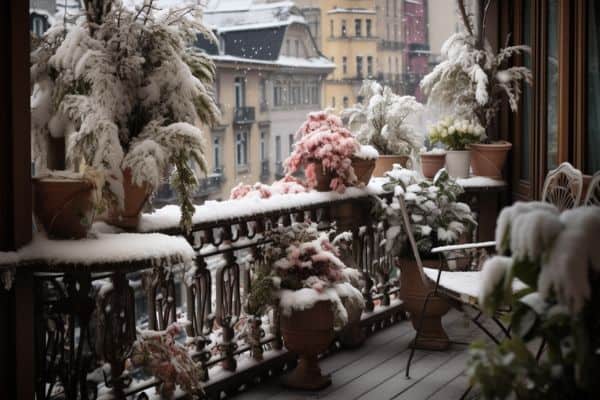
Understanding Your Balcony’s Winter Conditions
Role of Temperature
During winter, the temperature on your balcony can fluctuate quite a bit.
These temperature changes can affect the health of your plants and their ability to survive the cold months.
Be sure to monitor the temperature on your balcony and provide protection for your plants, such as insulating plants covers, a balcony blind or take your temperature-sensitive plants indoors.
You can also wrap the containers with materials like burlap or bubble wrap to insulate them during winter.
Light Availability
Winter days can be quite short, so there’s less light available on your balcony.
To help your plants receive enough sunlight, place them in areas where they can make the most of the available light.
You can also try using grow lights for plants that require more sunlight than the winter months can provide.
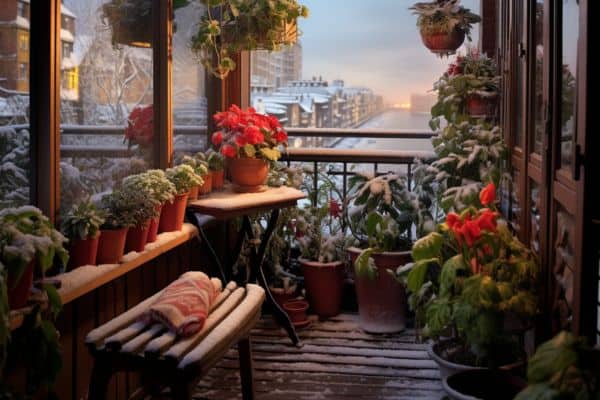
Recognizing Frost and Freezing Conditions
Frost and freezing conditions can cause significant damage to your balcony plants so it’s important to keep an eye on the weather forecast.
Michigan State University Extension recommends covering plants with a sheet, frost cloth or blanket, which will help to insulate them and prevent frost damage.
Make sure that the cloth or blanket is securely fastened, so it doesn’t blow away in the wind.
It’s also a good idea to add a layer of mulch around the base of your plants to help insulate the soil and protect the roots from the cold.
Consideration for Wind and Snow
Wind and snow on your balcony can also affect the well-being of your plants in winter.
Strong winds can lead to dehydration, while heavy snowfall can physically damage plants and break stems or branches.
To protect your plants from harsh winter conditions, consider creating a wind barrier, regularly clearing snow from your balcony, and securing plants in sturdy containers.
Choosing Your Winter Balcony Plants
Winter doesn’t have to mean the end of your balcony garden.
With the right plants, you can maintain a thriving garden throughout the colder months.
In this section, I’ll cover some options for annuals, perennials, herbs, vegetables, and bulbs that are suitable for winter balcony gardens.
Annuals and Perennials
Annual flowers, such as pansies, violas, and snapdragons, are great choices for color and interest during the winter months.
These hardy plants can withstand cold temperatures and even a light frost.
Perennial flowers, such as hellebores, cyclamen, and winter jasmine, are also suitable for a winter balcony garden.
These plants are known for their ability to bloom during the colder months and can add a touch of beauty and fragrance to your balcony.
RELATED: 5 Winter Flowering Annuals
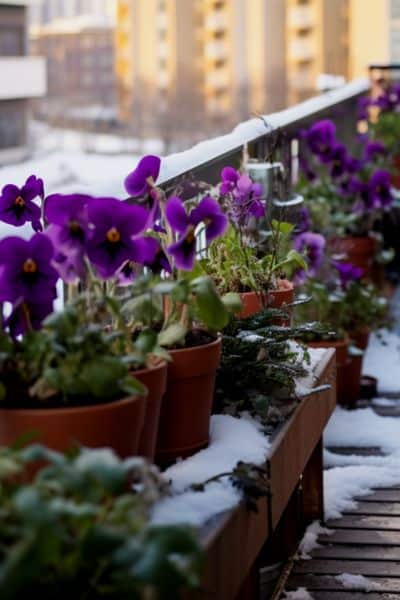
Herbs
Herbs can be a great addition to your winter balcony garden due to their usefulness in cooking and their ability to withstand cooler temperatures.
Some hardy herbs that can thrive in winter include sage, rosemary, thyme, parsley, and chives.
When selecting herbs, be sure to consider your hardiness zone to ensure the plants you choose can survive the winter months in your area.
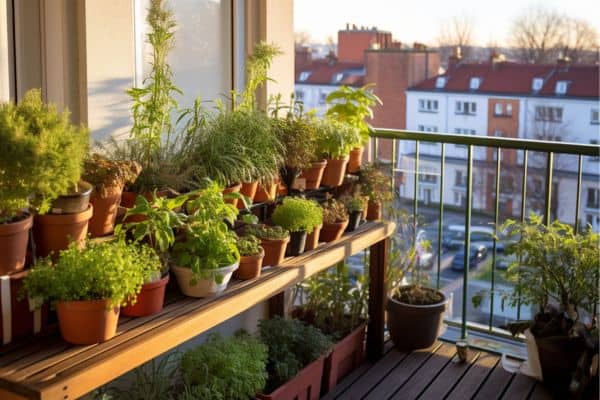
Vegetables
There are several winter-hardy vegetables that can be grown successfully on a balcony garden during the colder months.
Some options include kale, Swiss chard, beets, carrots, spinach and bok choy.
These vegetable plants are tolerant of cold temperatures and frost, so they’re ideal for a winter balcony garden.
RELATED: 15 Frost Tolerant Vegetable Plants
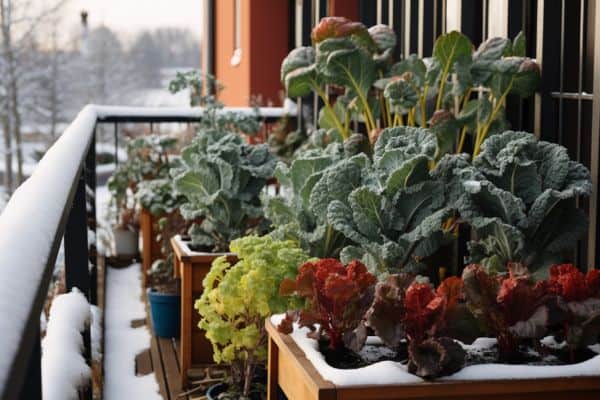
Bulbs
Bulbs can provide beautiful blooms during the winter months, so they’re a great addition to any balcony garden.
Some popular winter-blooming bulbs include snowdrops, crocus and daffodils. These bulbs grow well in containers and can tolerate cool temperatures.
When planning your winter balcony garden, keep these suggestions in mind and select a variety of plants that are appropriate for your hardiness zone.
RELATED: 10 Winter Flowering Bulbs
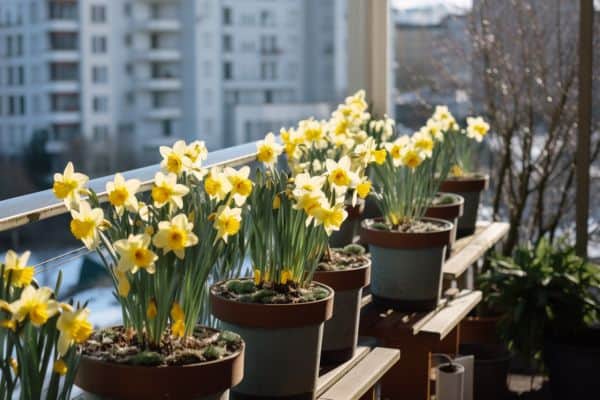
Preparing Your Balcony Garden for Winter
Proper Pruning
Before winter sets in, give your plants a trim to get rid of dead, damaged, or diseased parts.
This will help your plants stay healthy, improve their shape, and maintain a manageable size during winter.
For roses and other shrubs, prune them back to a more compact size, so they’re easier to protect from cold temperatures.
Correct Watering Regimen
As the weather cools down you can reduce the frequency of watering.
Most plants enter a dormant phase during cold months, so they need less water.
Ensure the soil remains slightly moist, but avoid overwatering as it can lead to root rot. [1]
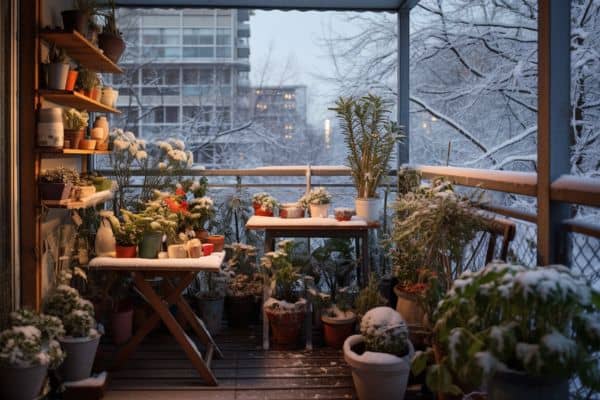
Use Mulch
Using mulch on container plants over winter is a great way to protect them from the cold and ensure their survival.
Mulch is a natural insulator, so it helps to regulate the soil temperature and prevent the roots from freezing.
It also helps to retain moisture in the soil, which is important during the winter months when plants can dry out more easily.
When using mulch on container plants, it’s important to choose a material that is well-suited to your plants and climate. Some good options include straw or shredded leaves.
Spread a 2 to 3 inch (5 to 7 cm) layer of mulch around the base of your plants to keep them warm and happy.
Feeding and Fertilizing
Fertilizing balcony garden plants during winter isn’t really necessary for plants that become dormant.
If you’re growing vegetables, herbs or annual flowers like pansies, you can use a slow-release fertilizer that will gradually release nutrients over time.
Another option is to use an organic fertilizer, like compost, bone meal or worm castings, that provide a rich source of nutrients for plants.
It’s important to follow the instructions on the fertilizer package and not over-fertilize, as this can harm your plants.
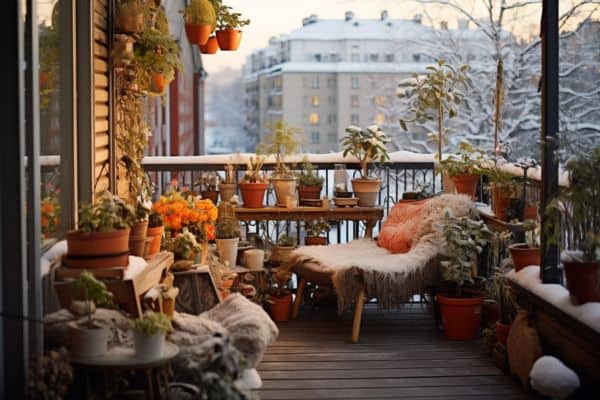
When Winter is Over
If you’ve overwintered your plants indoors you can take them back outside when the weather starts to warm up.
Check the weather forecast to make sure that the temperatures won’t drop below freezing.
Once you’re ready to move your plants back outside, start by placing them in a shaded area to allow them to acclimate to the brighter light and stronger sun.
Gradually increase the amount of time they spend in the sun each day until they are fully acclimated.
RELATED ARTICLES
- 10 Best Trees for Balconies
- 10 Balcony Garden Mistakes to Avoid
- 15 Fragrant Balcony Garden Plants
- Fertilizing Plants In Winter
- 5 Winter Flowering Annuals
With the right care and attention, your balcony garden plants can continue to flourish even during the colder months of the year.
Are you on Pinterest? Check out my Balcony Garden and Flower Gardening boards for more ideas. You can also find me on Facebook.


